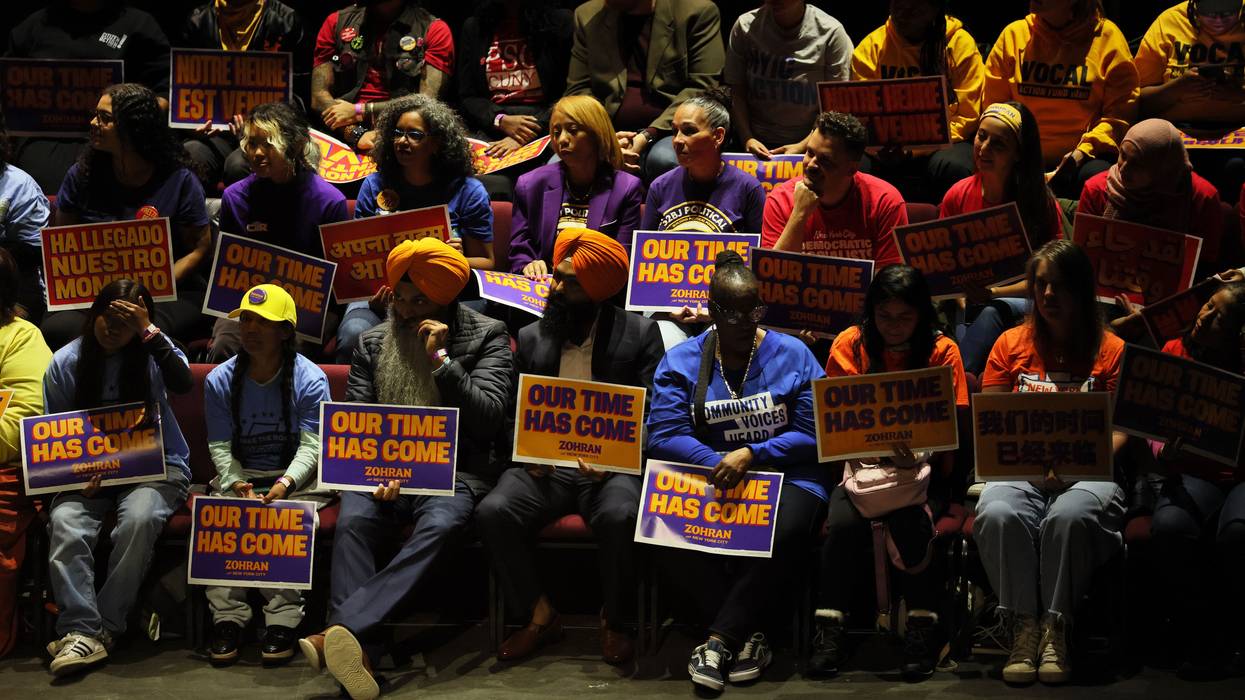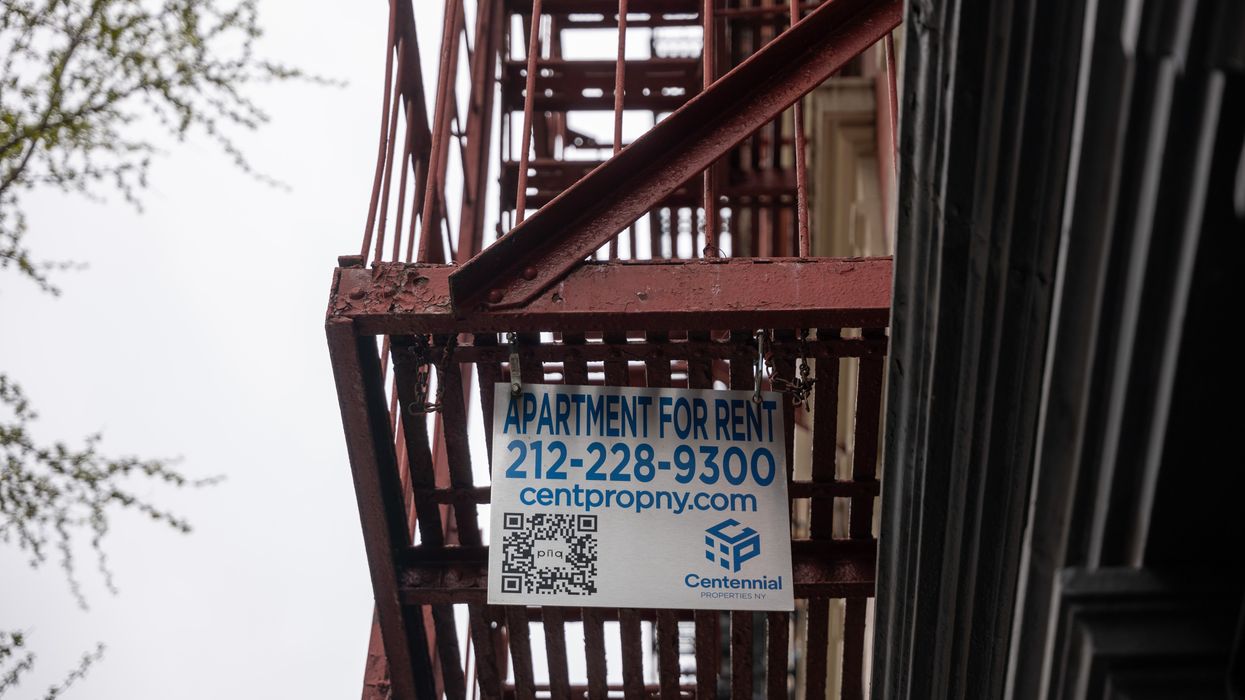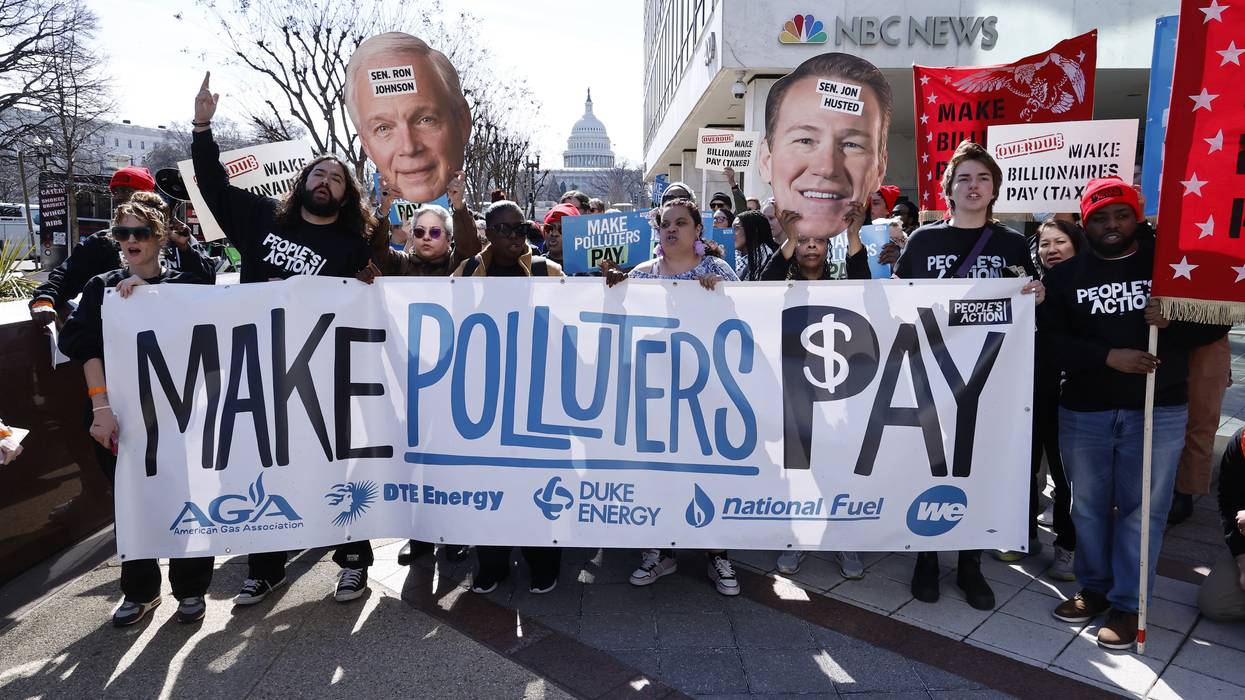The participants—who hailed from 60 congressional districts across 27 states—emphasized issues including unaffordable rent rates, housing insecurity, homelessness, denied medical treatment, unpayable healthcare costs, high utility bills, health harms from fossil fuels, and corporate lobbying for tax cuts that benefit companies and billionaires rather than working people.
"We're here today because we want to make the rich pay their fair share!" declared JJ Ramirez of People's Action Institute member organization VOCAL-Texas. "Blackstone is a private equity company that has over 300,000 rental properties across the country. They gobble up these homes, raise our rents, price gouge us, and then evict us when we can't afford to live in their places. We're here today because Blackstone has conspired with other corporate bad actors so they can gobble up everything that we have."
While the protesters gathered outside Blackstone, they stressed that corporate landlords in general are an issue. Ann Kiesling of Progressive Maryland, which supported tenants at the Enclave Silver Spring apartment complex, said that "I will never forget a woman with a disability telling me about the time she had to hop up, with the help of a neighbor, 15 flights of stairs to get to her apartment because the landlords refused to fix the elevators. I will never forget the parents of a four-year-old telling me how they had to heat up water on their stove to give their kid baths because their landlord refused to fix their hot water for over a month."
"An out-of-state private equity landlord, Hampshire Properties, is raking in massive profits by charging luxury rent prices while letting the building fall apart and leaving tenants with the consequences," Kiesling continued. "And while we are here fighting for basic living conditions against mold, broken elevators, pest infestations, corporate landlords like Hampshire Properties, like Greystar, like Blackstone, are pouring our rent money into lobbyists and elected officials' campaigns instead of fixing their buildings."
Hannah Peterson, a disabled veteran, seminary student, and member of the People's Lobby in Chicago, pointed out Wednesday that "just last night, House Republicans passed their budget resolution to cut millions from Medicaid."
That resolution
sets the stage for cutting not only $880 billion from the healthcare program that serves low-income Americans, but also $230 billion from the Supplemental Nutrition Assistance Program (SNAP), commonly called food stamps. Elected Republicans, who control both chambers of Congress and the White House, want to gut safety net programs to fund an expansion of tax giveaways to the rich that GOP lawmakers passed and President Donald Trump signed in 2017.
"Republicans are already funneling our tax dollars out of programs our communities need and into pockets of private corporations and billionaires," Peterson said. "We deserve a government that uses our money to fund our care, not one that uses our money to line the pockets of corporations."
As Medicare for All advocates often highlight, although the United States has Medicaid and Medicare, which serves seniors, it is the only developed country in the world without universal healthcare. Instead, the U.S. has a for-profit system that often leaves patients unable to access or afford necessary care, including because of denials from insurance companies.
"To the folks at UnitedHealthcare... if you really care about people's health, why don't you publicly come out and oppose the cuts to Medicaid?" asked Citizen Action of New York's Amelia Bittel—who has dysautonomia, a disorder that led to a heart surgery at age 35 and requires weekly blood draws.
"In my city of Syracuse, New York, 48% of the population relies on government-funded programs to get their insurance," said Bittel. "You don't need the $1.3 billion that you stand to profit from these cuts. Your company routinely reports the highest profits. Why not give back to the patients?"
At the American Gas Association, Gloria de Graves from Citizen Action of Wisconsin explained that in the Midwestern state, "if you're not familiar, we hit negative 30°F sometimes, and that means that people can freeze to death in their homes if they do not have a way to heat their homes."
"So all I'm saying is We Energies and Xcel Energy, who I have paid plenty of money to over the years, need to stop charging us so much money so that we can afford to feed ourselves, we can afford to stay housed, and when we are fleeing domestic violence, that there is a safe, electrified, and heated home to go into so that we are warm and safe in the winter," de Graves said.
Celebrating the multisite protest on Wednesday, progressive Congresswoman Rashida Tlaib (D-Mich.) said that "I want to thank you from the bottom of my heart, because there are people in my community that can't afford to come up here."
"It is so important to understand corporate greed and how it is embedded in environmental injustices, embedded in environmental racism," she said. "They want the federal government to continue to literally fund poisoning us, while we get sick here in our country. So they're making us sick, and we're subsidizing the fact that we don't have access to healthcare that supports our families."
In a dispatch earlier this week, People's Action executive director Sulma Arias wrote that her group "refuses to give up. We believe ordinary people have the power to rise and meet this and every moment, if we act together. We believe in the fundamental dignity of every person, without exception, and we believe government exists to serve all people—We the People—not the wealthy few."




